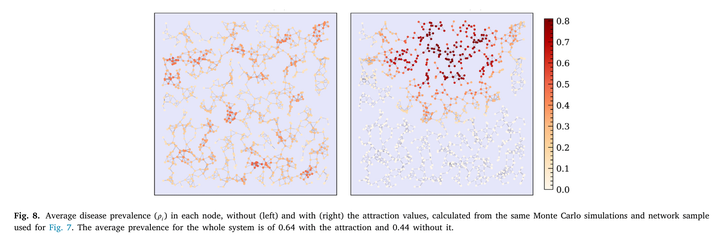 Average disease prevalence in each node, without (left) and with (right) the attraction values, calculated from Monte Carlo simulations. The average prevalence for the whole system is of 0.64 with the attraction and 0.44 without it.
Average disease prevalence in each node, without (left) and with (right) the attraction values, calculated from Monte Carlo simulations. The average prevalence for the whole system is of 0.64 with the attraction and 0.44 without it.Abstract
Mathematical models represent one of the fundamental ways of studying nature. In special, epidemic models have shown to be particularly useful in the understanding of the course of diseases and in the planning effective control policies. A particular type of epidemic model considers the individuals divided into populations. When studied in graphs, it is already known that the graph topology can play an important role in the evolution of the disease. At the same time, one may want to study the effect of the presence of an underlying attraction landscape of the vertices, apart from the respectively underlying topology. In this work, we study metapopulations with small number of individuals in the presence of an attraction landscape. Individuals move across populations and get infected according to the SIS compartmental model. By using a Markov chain approach, we provide a numerical approximation to the prediction of the long-term prevalence of the disease. More specifically, an approach that combines two binomial distributions for mobility, with appropriate assumptions, is proposed to approximate the model. The problem setting is simulated through Monte-Carlo experiments and the obtained results are compared to the mathematic-analytical approach. Substantial agreement is observed between both approaches, which corroborates the effectiveness of the reported numerical approach. In addition, we also study the impact of different levels of attraction landscapes, as well as propagation on the local scale of the entire population. All in all, this study proposes a potentially effective approach to a mostly unexplored setting of disease transmission.